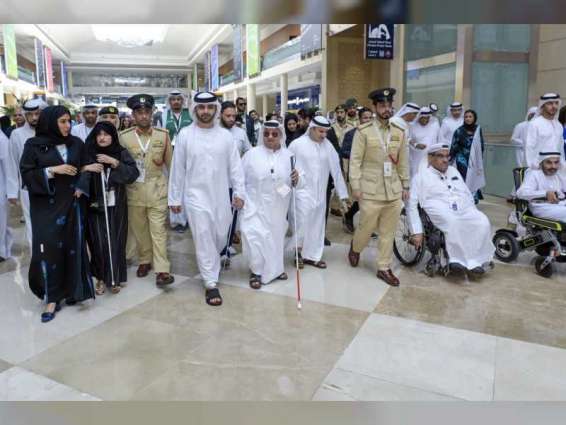DUBAI, (Pakistan Point News - 15th Oct, 2023) H.H. Sheikh Mansoor bin Mohammed bin Rashid Al Maktoum, Chairman of the Supreme Committee for the Protection of the Rights of People of Determination in Dubai, led a celebratory march on the occasion of International White Cane Day.
The march weaved through the halls of the Dubai World Trade Centre (DWTC), with participation from visually impaired individuals, government employees, educational institutions, and other officials.
Speaking on the occasion, His Highness said: “Every year, this day reminds us of the strength and determination exhibited by individuals with visual impairments, serving as a source of inspiration to us all.”
He further stated, “Under the guidance of the leadership, the UAE consistently strives to lead in empowering and equipping this segment of the community. This commitment involves creating an enabling environment that ensures their active involvement across various domains, including education, employment, as well as social and cultural endeavours. Dubai aspires to lead globally in delivering comprehensive services to people of determination. This ambition is upheld through investments in technological innovations and the adoption of international best practices. It is crucial to underscore the significance of safeguarding their rights across all spheres, recognising their integral role in society's fabric and its human wealth.”
The march, arranged by the Community Development Authority in Dubai (CDA), was attended by Abdullah Mohammed Al Basti, Secretary General of The Executive Council of Dubai; Hessa bint Issa Buhumaid, Director General of the Community Development Authority in Dubai; and Abdullah bin Khadiya, Director of the Air Transport Department at the Dubai Civil Aviation Authority.
Ahead of the march, the CDA hosted a retreat titled ‘Dubai, the Future through Their Eyes’.
The retreat was attended by Hessa bint Issa Buhumaid and featured participants with visual impairments from over ten entities and associations in the UAE.
Also in attendance were government employees and educational institution staff. The session aimed to delve into their experiences, highlighting milestones and challenges. This gathering also identified opportunities for developing innovative, high-quality services and solutions to enhance their participation in all facets of society.
Hessa bint Issa Buhumaid, said that International White Cane Day is a worldwide opportunity to demonstrate unity with people of determination, and especially those with visual impairments. It serves to deepen our understanding of their requirements and our commitment to bolster their self-sufficiency and empowerment.
She noted that the white cane symbolises strength and resilience, aiding its users in navigating life's challenges.
“On International White Cane Day, we reaffirm our commitment to finding innovative solutions to overcome obstacles that prevent people with disabilities from fully enjoying their rights in society. Our ongoing commitment is to meet their aspirations and introduce impactful initiatives that cater to their daily needs. Their strength is a source of inspiration for us, and we support and respect their determination, resilience, and excellence,” she added.
Participants at the retreat discussed several key themes, including the requisite skills and capabilities essential for motivating individuals with visual impairments to embark on careers and entrepreneurial ventures. Additionally, they highlighted the challenges they encounter within various public services, particularly in the realm of banking services.
The agenda also included considerations related to expanding inclusive infrastructure for public amenities, hotels, and shopping centres to ensure comprehensive accessibility.
The retreat culminated with a series of recommendations that will lead upcoming initiatives and strategic plans across various areas, including building infrastructure to further support individuals with visual impairments.
Other suggestions included implementing voice-support applications in dining establishments and public venues. Additionally, proposals centred on simplifying commercial transactions, such as the verbal articulation of product specifications through QR codes. Additional initiatives suggested included revising central bank regulations to be more inclusive of the visually impaired.




